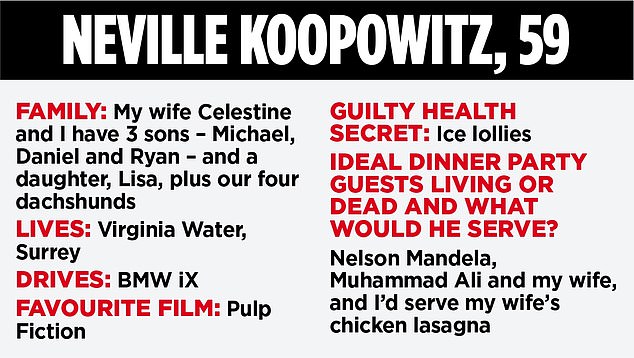Health insurance is not most people’s favourite subject. Often it is a ‘grudge purchase’, with customers stumping up the premiums through gritted teeth.
But Neville Koopowitz, the chief executive of insurance company Vitality, has a secret weapon: the company mascot, Stanley the dachshund.
Stanley, who is possibly the best-loved canine in corporate Britain after the Andrex puppy, has been the doggy embodiment of the business strategy.
This is to incentivise reluctant exercisers with a policy to work out more, eat better and take care of their mental health, in return for a range of benefits and cheaper premiums.
When I arrive at Vitality’s London headquarters, I almost trip over an extremely realistic, life-size model of Stanley, and the branding is everywhere.

Mr motivator: Neville Koopowitz with the company mascot Stanley the dachshund
South Africa-born Koopowitz, who himself owns a fleet of four dachshunds: Vinny, Coco, Lolly and Cino, says the small dogs are ‘the anti-heroes of exercise’.
He adds: ‘They have little legs, they don’t want to go outside for a walk when it is wet. They love crawling into warm blankets and sleeping. Basically, they are quite cynical, a bit pampered and they don’t have owners, they have staff.’
Recently, after years of mocking his humans’ efforts at self-improvement, Stanley has undergone a personality change.
Koopowitz says: ‘He has realised exercise is quite fun and now he is more active. We got him through an agency. We have had three or four Stanleys. A lot of people send us pictures of their dogs, asking if they can be in the ad.’
Vitality is owned by Discovery, a leading South African insurance company with 4.4 million customers.
It began 28 years ago with what Koopowitz describes as ‘a hunch’.
‘We thought we could encourage people to live healthier lifestyles, that it would be good for us as an insurer because there would be fewer claims and that society would also benefit. We had no evidence at that stage, but we do now.’
His data suggests that members on average increase their exercise levels by 22 per cent after joining.
‘Those who engage in the Vitality programme fully have 39 per cent lower mortality risk, if they get to Platinum status,’ he says.
The programme works by linking a smart watch or phone to the Vitality app.
Then you can accumulate points for exercise, mindfulness, check-ups and healthy eating.
Customers start on bronze status, then work their way up via silver and gold to platinum.
‘The real benefit is for people who are unfit when they start,’ Koopowitz says. ‘If you have a 60-year-old who had never exercised, even a couple of thousand steps a day would make a difference.’
Vitality, says Koopowitz, is the third largest health insurance operator in the UK with 15 per cent of the market, behind Axa and Aviva.
It has close to 1 million customers on its health plan and a further 750,000 with life assurance policies.
Around a quarter of health policies are held by individuals, including myself, but most are via employers. ‘We focus on the small and medium firms,’ he says. ‘That has been the biggest growth area for us.
‘We are seeing seven-to-eight person companies purchasing for the first time as a way of attracting talent. Benefits such as a virtual GP are very attractive.’
He argues that we need to ‘consumerise’ health care.
‘In every other market, you get reviews. You should get the same in health. If you have a great experience with Doctor X people should know. We are getting much more focused on that sort of granular information.’
Preventative health measures, he says, are key to sustaining the NHS.
‘I come from a country without much of a health service. The NHS is a brilliant entity, but like all health services it is facing challenges of demand. We have ageing populations and someone has to pay for it. Prevention is the best form of protection.
‘We used to be worried about communicable diseases such as TB, Aids or malaria.
‘Now the issue is preventable or manageable diseases to do with lifestyle and behaviour.’
Isn’t it hard in the middle of a cost-of-living crisis, to persuade people to take out a health insurance policy or to join a gym?

‘We returned to members over £100 million of value in 2022 through the benefit programme and premium reductions,’ he says.
Members can receive these discounts on their premiums for being active. Koopowitz is also looking at changing rules about pre-existing conditions. In some cases, these are excluded for a limited period of, say two years.
After that, if there have been no claims, the condition can be covered. The only hitch is, that the onus is left on the policyholder to inform Vitality, which means there is a big risk they will forget and lose out on valuable protection.
After I raise this issue, he has set up a team looking into automating the process, so customers will automatically receive cover when the exclusion period is up. He is now changing the system so they will be covered automatically after the time limit is up.
Vitality employs around 2,500 in the UK, mostly in Bournemouth, as well as in spectacular London offices overlooking the Thames and in Stockport.
Might a separate float on the UK stock market be on the agenda?
‘At this point we have no need for capital so we have no need to look at a float,’ he says.
The business, he says, has an embedded value of about £1.2bn ‘which puts us firmly in the FTSE 250, in the middle to top end. We are getting close to £1bn a year premium income.’
Koopowitz was brought up in Queenstown, now called Komani, in the Eastern Cape province of South Africa.
‘It is the most economically disadvantaged part of the country. Nelson Mandela grew up there.’
After a commerce degree, he joined Discovery in the mid 1990s and came to the UK in 2010 to lead Vitality. He goes back to South Africa regularly, to visit his mum, who still lives in the Eastern Cape, as do his wife’s family.
‘I have a holiday home there. Once a year everybody congregates.’
The biggest moment of his career so far was, he says, meeting Nelson Mandela. He says: ‘It was a bit surreal. He wanted to meet young white South African business people. At that time, in the mid-1990s, it was a very tenuous situation and there was a lot of nervousness about what would happen.
‘There was stockpiling of baked beans and candles. The build up to the elections was scary. We met at his house, in a suburb of Johannesberg called Houghton. His secretary Zelda, who became famous herself, was very protective. We had a cup of tea, for about half an hour.
‘His compassion and understanding was amazing.
He wanted the country to go forward and to be as inclusive as possible. UK politics seem very tame in comparison.’
Some links in this article may be affiliate links. If you click on them we may earn a small commission. That helps us fund This Is Money, and keep it free to use. We do not write articles to promote products. We do not allow any commercial relationship to affect our editorial independence.



